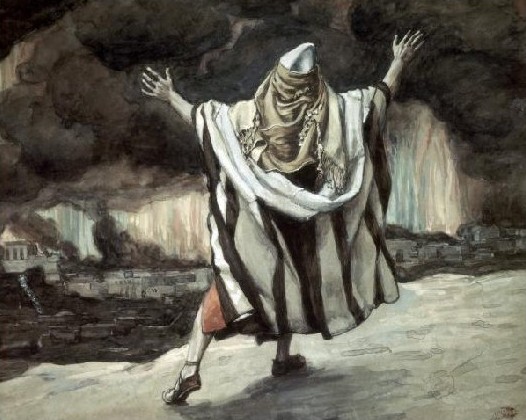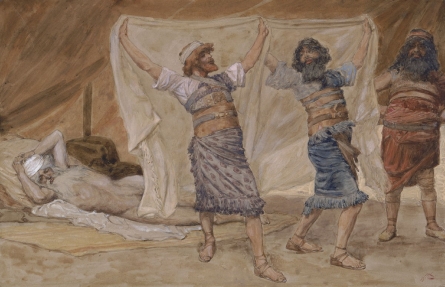Abraham Sees Sodom in Flames - James Tissot
‘And the Lord God formed man from the dust of the earth and blew into
his nostrils the breath of life.’ -Genesis 2:7
He was a mound of mud. Just another fold of earth
indistinguishable from his surroundings. From the earth he was taken, and to
earth he would return. But now he lay there, his back pressed against the soil.
If this were the grave, his face would have been cold and ashen, his eyelids
sealed forever. But here was a man awoken. Here was a beating heart. Here was a
beginning not an end.
Adam opened his eyes: open, shut, open. Night faded. Morning
drew away dawn’s breath. The mist departed. No longer was this a mound of mud,
but a man alive. On his back, Adam gazed skyward. Imagine his first glimpse as the
vault of heaven filled his eyes…. What a testament to human nature! Between the
first kicks in the womb and the repose of the grave — the sky is the limit.
Half beast half seraph, Adam lay there between sleeping and flying.
A favorite poet, Theodore Roethke once wrote: “What is
madness but nobility of soul at odds with circumstance?”[1]
In all the Bible, there is perhaps no soul more noble than that of Abraham our
father. His every action is at odds with circumstance, his very faith at odds
with an entire world. Every friend became a doubter. ‘Where are you going
Abraham? You leave your country, your birthplace, you dare abandon your father’s
home! This is madness, Abraham. Who is this unheard-of-God that you claim to hear?
What God says “go to some place which I will show you?” If He can make heaven and earth, why does this place not have a name?’ Where are
you Abraham? Where?’
“A man goes far to find out what he is—,” wrote Roethke. In
Abraham’s case, very far indeed. From the great plains of Mesopotamia, westward
to Assyria, south to Canaan than down to Egypt and back again. “Traveling
continually...,” the Torah records, but always “to the place that I will show
thee.”
It was a dark world, few were kind to strangers. Not the
Pharaoh of Egypt who kidnapped Sarah, or the Philistines on the coast, who did
the same. His nephew Lot departs after a dispute over flocks and pasturage. An
unspoken rebuke. Abraham abandoned family once, now family abandons him.
We have heard this story more than once. The people of Sodom
were neither kind nor generous. Yet when a near fist of kings sacks their city
taking property and people alike (including Lot), Abraham plots a rescue. His
audacity is foolish. His courage military folly. 318 men against the might of
four kings. But Abraham is successful. He wages war, his enemy retreats. When
offered spoil, he takes not a ‘shoelace’ for himself. (14.23) People and
property are returned to the king of Sodom. An altruistic war, fought purely on
behalf of others. And think of these
others, Sodom, who denied guest-right to guests, who later sought to humiliate
Lot and his household for treating strangers with dignity and respect. The
city’s evil rises up before the Lord, which God overturns in brimstone and
fire. Yet Abraham’s compassion extends even to wrongdoers, enemies of the very way
of life he holds dear. Was this nobility or madness?
Which I is I?
Roethke asks. Even Abraham has doubts. He and Sarah are advanced in age,
without natural heir. “Shall Eliezer of Damascus inherit me?” asks Abraham of God.
How long can a man live in clouds which never rain?
“In a dark time the eye begins to see,” wrote Roethke. Out
of the depths, a voice emerges. “Then the Lord’s word came to Abraham in a
vision, ‘Be not afraid Abram…your reward is exceedingly great.’” ‘Come outside
Abraham. “Pray look toward the heavens and count the stars, can you count
them?”’ (Gen. 15.5)
Rabbi Judah opined in the Talmud that when Adam was first
created his body stretched from one end of the earth to the other. (Sanhedrin
38b) No earthly power could contain him. It was only after his disobedience that man
was shrunk to his present size. But in Abraham, God found something of the Adam
He had first conceived; A man who saw the infinite in the imminent: “And Abraham
lifted up his eyes and saw the place from afar” (Gen. 22.4) Here stood a man who
thought not of scaling the mountain,
but of scaling the clouds above. (Rashi ibid) “Can you count the stars? So shall your seed
be.”
We know nothing till we try. Every heart has its doubts. We dream dreams but then tell ourselves: 'It is too much, it is too late.' Another great poet, Rainer Maria Rilke, lamented: “Everything is far / and long gone by.” But there is still time. Rilke writes: I would like to step out of my heart / and go walking beneath the enormous sky [2]
Such was Adam when he first gazed
above. Such was Abraham, a noble madman, who one desert night stepped outside his heart and walked with God beneath the sky, who listened to the stars whisper and
heard in them the voices of a nation that would number as the sand.

